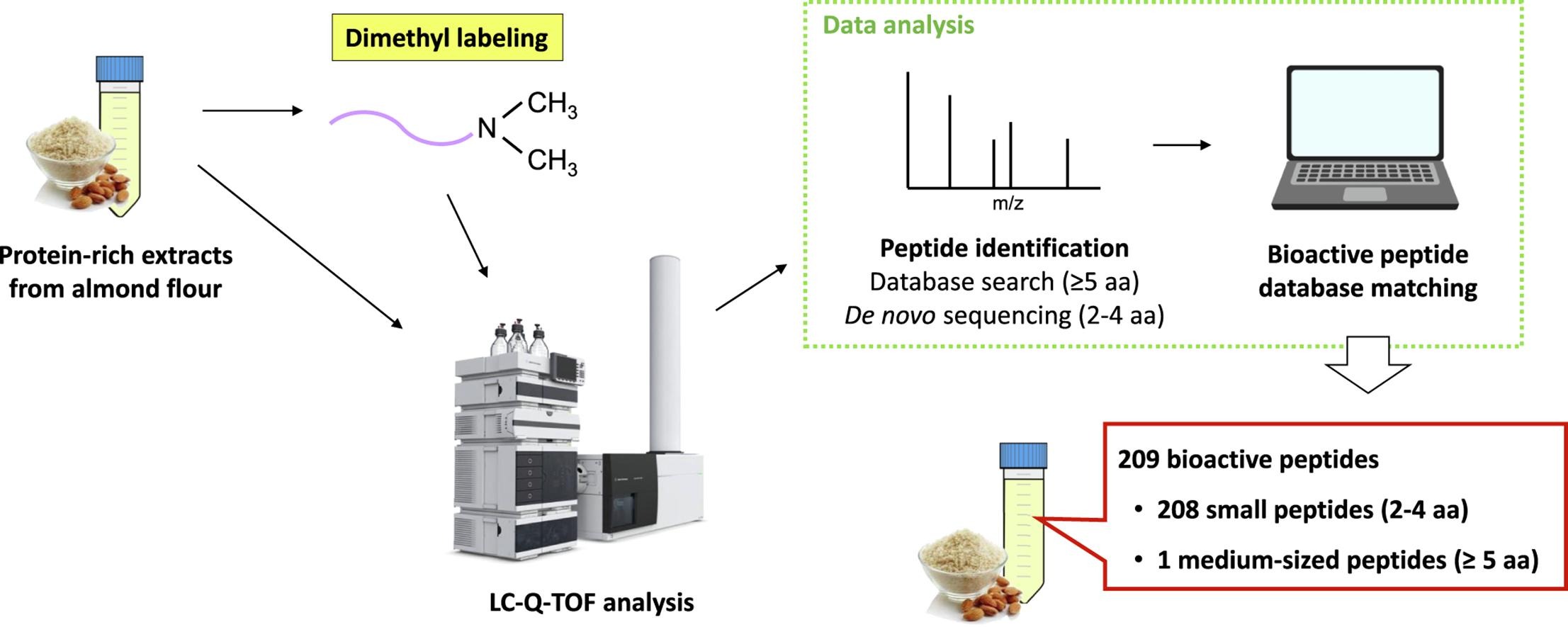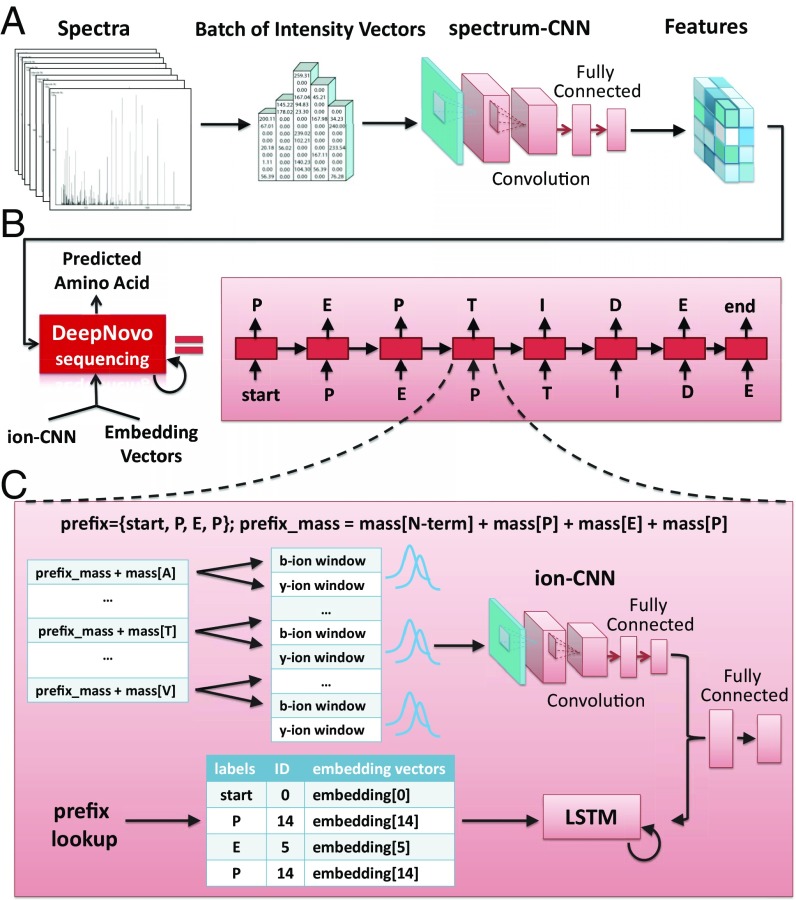Peptide Sequencing Service
Peptide Sequencing Service is an essential service for the identification and analysis of peptides, which plays a pivotal role in peptide drug discovery and development. Thousands of naturally identified peptides have been recognized, playing important roles in human physiological processes, including as hormones, neurotransmitters, growth factors, ion channel ligands, or anti-infectives. Peptide drugs are considered to have high selectivity and efficacy, as well as relative safety and good tolerance. Therefore, interest in peptide drugs in drug research and development (R&D) is increasing, with hundreds of peptide drugs undergoing clinical trial evaluation. The Peptide Sequencing Service is crucial in this process, enabling researchers to accurately determine the amino acid sequence of peptides, a fundamental step for designing and optimizing peptide-based therapeutics.

Huang, Y. P. et al. Food Chem. 2022.
Workflow for Identification of Small Active Peptides based on LC-MS/MS Sequencing
Peptides and proteins are both composed of amino acids, the basic building blocks of the human body, and are linked together by peptide bonds. The difference between them is that peptides are composed of smaller chains of amino acids compared to proteins. Peptides contain two or more amino acids and can be subdivided into oligopeptides and polypeptides. Peptide Sequencing Service plays a key role in determining the exact composition and sequence of these amino acid chains, providing valuable insights for peptide function and application. Oligopeptides contain a small number of amino acids (about 2-20 amino acids), while polypeptides contain more amino acids. However, this definition and the way scientists use each term are sometimes not very rigorous. Proteins are formed by the connection of one or more peptides. Therefore, proteins are essentially very large peptides. Peptide Sequencing Service is essential for accurately identifying and characterizing the amino acid sequences of peptides, which is a fundamental step in advancing peptide-based research. Generally, we distinguish between peptides and proteins based on the number of amino acids. Peptides are composed of 2 to 50 amino acids, while proteins are composed of 50 or more amino acids. Peptide drug research has great potential, such as the discovery of new peptides, more targeted peptide libraries and sequence optimization design, new formulation development, multifunctional peptides, and complex development, etc. To achieve these, the identification and sequencing of peptides are the first steps to promote research.
Services at Mtoz Biolabs
There are two common methods for peptide sequencing: database search and de novo sequencing. For relatively short peptide segments, such as those less than 30 amino acids, MtoZ Biolabs directly performs secondary fragmentation to obtain mass spectrometry raw data for peptide sequence inference. Through database search or de novo sequencing, the theoretical sequence can be obtained. Peptide Sequencing Service at MtoZ Biolabs ensures that these sequencing techniques are applied with precision, providing accurate results for peptides of various lengths. For longer peptide segments ( > 30 amino acids), MtoZ Biolabs uses three proteases to separately enzymatically digest and identify the target peptide segments. While obtaining fragmented peptide segments, the complete peptide sequence is determined by splicing between peptide segments, which is achieved by de novo sequencing. The above methods can also be used for sequence analysis of some peptide mixtures.
Based on Thermo's latest Orbitrap Fusion Lumos mass spectrometer combined with nano-LC technology, MtoZ Biolabs provides comprehensive Peptide Sequencing Service, including mass spectrometry peptide sequence analysis services and peptide de novo sequencing services. The Orbitrap Fusion Lumos mass spectrometer is the highest resolution and sensitivity mass spectrometer available, ensuring the sensitivity of low-abundance peptide fragment identification. During peptide fragmentation, the HCD and ETD combination mode ensures the integrity of peptide fragment fragmentation. After obtaining the mass spectrometry raw data, for peptide segments less than 30 amino acids, we use database or de novo sequencing methods to parse the raw data. For peptide segments longer than 30 amino acids, de novo sequencing is generally used to deduce the peptide sequence.
Sample Submission Requirements
1. Prepare as Much as Possible 100 μg of sample
For samples < 30 aa, prepare at least 10-25 μg of sample; for samples > 30 aa, prepare at least > 50 μg of purified sample.
2. Use the Purest Reagents as Possible, Not Molecular Bbiology Grade Reagents
3. Use the Smallest Centrifuge Tubes as Possible
4. Avoid Contaminants or Concentrate the Protein in Solution
**Consult with MtoZ Biolabs technicians for targeted sample preparation.
Case Study
Deep Learning-Driven De Novo Peptide Sequencing
Traditional peptide sequencing methods rely on known protein databases for comparison, but when samples contain unknown or unrepresented peptides, the effectiveness of these methods is significantly reduced. In this context, de novo peptide sequencing becomes a critical need. A deep learning-based approach for de novo peptide sequence inference, called DeepNovo, has been proposed. This method uses convolutional neural networks (CNN) and recurrent neural networks (RNN) to extract features from mass spectrometry data and accurately predict peptide sequences. By doing so, it effectively decodes unknown peptides that cannot be matched through database comparison. Compared to traditional database-based methods, deep learning-driven peptide sequencing services offer higher accuracy and greater generalizability, especially when processing complex biological samples. This innovative technology not only enables the efficient identification and decoding of standard peptides but also allows for the discovery of new peptides not covered by existing databases.

Tran, N. H. et al. Proc Natl Acad Sci U S A. 2017.
The DeepNovo Model for De Novo Peptide Sequencing
MtoZ Biolabs can perform Peptide Sequencing Service on samples in both liquid and solid states. Solid samples can be transported with ice packs; liquid samples can be vacuum-dried or freeze-dried and transported with ice packs or transported with dry ice. Welcome to call for consultation.
MtoZ Biolabs, an integrated chromatography and mass spectrometry (MS) services provider.
Related Services
How to order?







